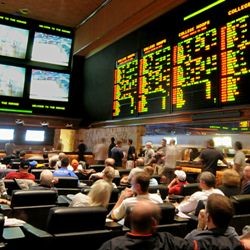The USA’s $12 Billion Sports Betting Market

When you think about the gambling industry, slot machines and table games probably come to mind first, but there is a whole other type of gambling that brings in billions of dollars in revenues each year, namely sports betting. Because sports betting isn’t legal in most places, it’s been difficult to know just how much is spent in the U.S. on betting on sporting events, but a recent report from GamblingCompliance is shedding some light on the subject.
The Facts of the Report
For their report, GamblingCompliance examined three aspects of sports betting:
– Casino: Casinos account for 12 percent of the revenue generated by sports betting, bringing in about $1.5 billion annually. The comparatively low numbers to the other sources of revenue are owed mainly to the fact that casinos are not readily accessible to many Americans.
– Online: Online sports betting brings in $4.5 billion in revenue for about 36 percent of total revenue.
– Retail: Retail outlets like sports bars, places that sell lottery tickets and betting shops account for around 50 percent of the revenue generated by sports betting with revenues of around $6.3 billion.
Questions Regarding Legalization
When you consider how well sports betting fares despite the fact that it is not legal in most places in the U.S., it becomes clear that this form of gambling could be profitable it were to be legalized across the United States. The $12.4 billion in revenue generated from sports betting isn’t far off from the $19.9 billion made through lottery sales. Legalization would likely push sports betting to the position of third most profitable form of gambling behind commercial casino gambling and tribal casino gambling.
Experts estimate that every year people illegally bet $95 billion on college and professional football in the United States, so complete national legalization would greatly increase money generated by sports betting. Legalizing sports betting nationally would require Congress to repeal the 1992 Professional and Amateur Sports Protection Act (PASPA). In the past, professional sports leagues have been decidedly against the idea of repealing the PASPA, but the NBA has come out in favor of it very recently.
Fantasy sports betting and its association with professional sports leagues has been instrumental in this latest industry alliance, as efforts are made to become part of a booming industry which is expected to reach $23.5 billion in revenues worldwide by 2020, according to a Eilers Research report. DraftKings and FanDuel are the two major sites in this space, although a recent scandal involving insider betting could see their legal standing challenged in court. Commenting on the overall sports betting situation in the U.S., American Gaming Association (AGA) President Geoff Freeman, said:
“Illegal sports betting is reaching new heights of popularity in America. It’s clear that a federal ban on traditional sports betting outside of Nevada is failing.”
States Pursuing Sports Betting Legalization
Some states aren’t waiting for the federal government to act. California and Pennsylvania both currently have active sports betting legalization bills under consideration, while another seven other states are also currently exploring whether or not legalization would be beneficial. These include New Jersey, which has been involved in a legal battle with the federal government to legalize sports betting at all casinos and racetracks within its borders for years. As Brian Murray, spokesman for New Jersey Governor Chris Christie, explained in a press statement:
“The people of New Jersey have spoken on this issue, and we will continue to fight to protect the will of our voters from the fickle and unfair application of outdated and unconstitutional federal law. At the end of the day, this isn’t just about New Jersey being treated fairly under federal law, but about the common sense reality of bringing a sports wagering industry that is already taking place every day in our state out of the shadows.”
Sports Betting Discretion For US States?
Although it will likely take time for U.S. lawmakers to begin seriously considering full legalization of sports betting, the GamblingCompliance report and the billions spent on illegal betting show that there is definitely a need to consider legalization. At the very least, the federal government may need to stop fighting New Jersey and other states and at least provide states with the discretion to establish their own laws regarding sports betting. Otherwise, billions of dollars will be left on the table.










